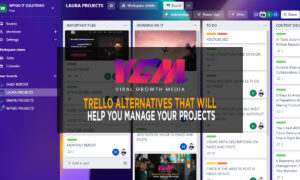The best platform for container orchestration is Kubernetes. Although it has been around for a while and is immensely well-liked, you should be aware that alternatives are available. This blog article will discuss the significant Kubernetes competitors and options. While some of these platforms are more recent to the market than Kubernetes, others have existed for longer. However, each of them has something unique to offer.

So, without further ado, here are the top Kubernetes alternatives and competitors:
-Docker Swarm:
The container orchestration platform from Docker. It is much simpler to use than Kubernetes and has been around for longer.
-Apache Mesos:
A fault-tolerant, highly scalable system for processing enormous amounts of data.
-Hashicorp Nomad:
A versatile, easy-to-use tool that is powerful yet simple.
-Kubernates on AWS (EKS):
Amazon’s managed Kubernetes service. It offers a lot of features and is very reliable.
-Azure Container Service (AKS):
The managed Kubernetes service from Microsoft. Even though it costs a little more than EKS, it has many additional features.
-Google Kubernetes Engine (GKE):
The Kubernetes managed service from Google. It has a ton of features and is simple to use.
-Rancher:
A user-friendly yet effective tool for managing containers.
-Flocker:
A device for controlling data volumes and containers.
-Weaveworks Flux: A
An open source program that can install containerized apps automatically.
These are only a few of the several Kubernetes rivals and options available. So, look into one of these alternatives if you’re searching for a Kubernetes substitute. You’ll no doubt locate one that satisfies your requirements.
An app’s code and dependencies are all contained in a software package known as a container. Containers may be hosted on bare-metal servers, on the cloud, or a combination of both. All these containers need an administrative system, and Kubernetes is now one of the most widely used. This post defines Kubernetes and highlights five of its top rivals.

What Is Kubernetes?
An open-source containerization platform is called Kubernetes, or “Kube.” The program was created by Google and made accessible as open-source software. Depending on what is appropriate for your company, Kubernetes enables you to execute apps on physical servers, public or private cloud storage platforms, or a combination of both. Additionally, it allows you to automate various formerly manual activities, such as deploying and scaling containerized programs. Your team can concentrate on more crucial duties rather than repeatedly doing the same tiresome labor.
Due to its open-source status and thorough documentation, Kubernetes is the most widely used container management software. Some people have looked for an alternative to this complex solution because the system has a steep learning curve and can be confusing to set up and use.
Alternatives to Kubernetes
As containerization has become more popular, new possibilities have emerged. You should consider these five Kubernetes alternatives:
-Amazon ECS
A well-known Kubernetes substitute is Amazon Elastic Container Service (or Amazon ECS), which is a managed service provided by Amazon Web Services that seamlessly connects with other AWS technologies. Using Amazon ECS makes the most sense if you already utilize AWS. However, this also implies that you are practically locked into Amazon as a vendor; switching your containerization strategy or web hosting provider and platform in the future may be expensive and complicated.
Additionally, you can use Amazon ECS to execute containers on EC2 or Fargate instances. Additionally, serverless, it offers assistance from AWS Professionals. (Kubernetes standards do not support serverless computing.)
-Docker Swarm
Docker is yet another open-source containerization option. Compared to Kubernetes, it is lighter and simpler to set up but less functional.
Since Docker has been around for a while, it has excellent support and documentation. However, some users point out that Docker is not well suited for large-scale containerization. Another option on this list might be more suitable for you if you manage a lot of clusters, pods, and containers.
-Nomad
Nomad is a container orchestrator that works with both legacy apps and containers. Installation is simple thanks to its single binary, and no outside services are needed. Numerous application workload types, including Docker, non-containerized, micro-service, and batch, may be executed by Nomad.
The HashiCorp product Nomad works nicely with the company’s other offerings, including Terraform and Vault. The drawback is that Nomad doesn’t offer as broad a range of capabilities as some of the other Kubernetes solutions because it requires less setup time.
-RedHat OpenShift
An alternative to Kubernetes that is based on it is RedHat OpenShift. OpenShift has produced a practical choice for developers by merging Google’s Kubernetes orchestration with Red Hat Enterprise Linux (RHEL) and Linux containers built by Docker. Furthermore, OpenShift is renowned for its robust security mechanisms, prohibiting running containers from gaining root access.
According to users, positive customer feedback indicates that OpenShift is easier to use than Kubernetes alone. However, they also claim that the documentation is lacking and that the logs might be challenging to read. It can be challenging to troubleshoot problems when they arise because of how small the OpenShift community is.
-Rancher
The rancher was developed to make it simpler to build Kubernetes clusters on servers located on-premises and in public and private clouds. Rancher is the perfect solution for smaller companies that lack the resources for comprehensive IT assistance because it frees engineers up to concentrate on developing without worrying about IT infrastructure.
Rancher’s helpful features are container load balancing, multi-cloud administration, user management, cross-host networks, and persistent storage services. Users point out that some topics may lack documentation, and offline installation and administration might be complicated.

Choosing the best Kubernetes Alternative
The most effective container orchestration for your requirements could increase team output. Still looking for the best business solutions, one of our unbiased experts will help you select your new preferred platform.
What are some of the most popular Kubernetes alternatives currently available?
Below is a look at some leading candidates fighting for a seat in your data center.
-Docker Swarm
One of the most well-liked alternatives to Kubernetes is Docker Swarm. It is a container orchestration technology, similar to Kubernetes, that can be used to deploy and manage containers across a server cluster. For individuals new to container orchestration or who don’t want all the bells and whistles that Kubernetes offers, Docker Swarm is a good alternative because it is easier to set up and operate than Kubernetes.
-Apache Mesos
Another well-liked alternative to Kubernetes is Apache Mesos. Created initially at Berkeley before being given to the Apache Foundation, it is an open-source project. Mesos and Kubernetes are comparable in that both allow for the deployment and management of containers across a cluster of machines. Mesos can manage workloads that aren’t containerized and is more versatile than Kubernetes.
-Hashicorp’s Nomad
Another well-liked tool for container orchestration is Nomad from Hashicorp. It may be used to manage and deploy containers across a cluster of computers, just like Kubernetes and Mesos. However, compared to competing for container orchestration solutions, Nomad is meant to be simpler and easier to use. It may also handle thousands of nodes and is highly scalable.

How do you decide which Kubernetes alternative is suitable for your organization?
This blog post will look at the main Kubernetes alternatives and rivals. An open-source platform called Kubernetes automates containerized applications’ installation, growth, and administration. Kubernetes, initially created by Google, has grown to be one of the most widely used orchestration platforms for containerized workloads.
Although Kubernetes is a vital tool, not every organization is a good fit for it. A different orchestration platform that better suits their needs may be preferred by some businesses. Others might not be prepared to use containers or lack the tools necessary to administer a Kubernetes cluster.
Here are some of the top Kubernetes alternatives and competitors to watch:
-Docker Swarm:
A platform for orchestrating containers native to Docker.
-Apache Mesos:
A general-purpose cluster manager with container orchestration capabilities.
-Hashicorp Nomad:
A versatile scheduler that works with many different workloads, including containers.
-VMware vSphere with Kubernetes:
Kubernetes distribution from VMware integrates with other VMware products and has extra functionality.
-Red Hat OpenShift:
Kubernetes platform designed for businesses by Red Hat.
These are only a few of the most well-known Kubernetes rivals and alternatives. It’s crucial to consider your unique demands and requirements when selecting an orchestration platform.
What are the key considerations when deciding between Kubernetes alternatives?
It’s crucial to take into account the following elements as you assess Kubernetes substitutes:
– Ease of use:
How simple are installation, configuration, and management?
– Supported platforms:
What environments and OSes does it support?
– Community support:
Exists a strong user and developer community surrounding the project?
– Features and functionality:
Does the platform offer all the capabilities and features you require?
– Pricing:
How does the cost compare to the alternatives?
With these factors in mind, let’s look at some of the top Kubernetes alternatives.

How do you get started with using a Kubernetes alternative?
Using Kubernetes alternatives can be done in a few different ways. The first is to employ a managed service, like Amazon EKS or Google GKE, which does the grunt work so you can concentrate on creating your applications.
Utilizing an open-source project, like Rancher or OpenShift, is another method to get started. You can use these projects’ resources and tools to operate Kubernetes on your infrastructure.
And finally, you have the option to implement Kubernetes on your own. Although it requires more work up front, this solution allows you total control over your Kubernetes environment.
Whatever strategy you choose, be sure to conduct your homework and pick the one that best suits your requirements.
Why do we need Container Orchestration?
We are all familiar with container orchestration. As we evaluate several Kubernetes alternatives on the market, let’s take a closer look at orchestration and why we need it.
The automation of administrative chores necessary to manage containerized applications is called orchestration. The scaling-in and scaling-out of an application, networking, container deployments, etc., are all automated by this process. If the application is tiny, all of these tasks can be accomplished without using an orchestrator; however, as the number of deployed containers and microservices grows, managing all of these containers becomes more challenging. Orchestrators can help in this situation.
There are alternatives to Kubernetes, including Amazon ECS, Docker Swarm, and Nomad.

How to choose the best Container Orchestration tool?
There are several orchestration platforms available. Therefore, your company’s requirements and maintenance capabilities should be considered while choosing the ideal one. While some orchestration solutions may have excellent qualifications, they may not be appropriate for your purposes. One Kubernetes option, for instance, is quite use-case specific. Your priorities and the technology you’ll need to work with will influence your chosen orchestration tool.
Before you choose a Kubernetes alternative that works for you, keep the following in mind.
- Flexible deployments and management should be offered by the tool.
- It should be easy to use and keep up with.
- Multiple languages are available for the graphical user interface (or front end) and the central management system. The web-based management dashboard enables remote monitoring over any Internet connection, configurable setups, and administration.
- Your willingness to invest time and money in mastering a new technology or tool
- The utility comes with a ton of documentation.
Challenges with using Kubernetes for container orchestration
-Load Balancer Configuration
However, by default, Kubernetes does not come with a load balancer whether you’re utilizing AWS or GCP. You must develop and release your cluster’s apps on your Load Balancer to direct traffic from the Internet to them, which may result in port conflicts and scaling problems.
-Managing Resource Constraints
To make the most of your computing resources, you must first understand how to use Kubernetes to request help for pods.
-Logging and Monitoring
There are numerous ways to accomplish the same goal. When everything is done correctly, it can be challenging to identify which component is at the problem because there isn’t much more information available than what is contained in the installation files. You cannot manage your tasks or ensure they operate effectively with assistance. To fully monitor your cluster, you’ll need three monitoring tools: Prometheus, EKL, and Grafana. You must install these programs separately because they aren’t included in the bundle by default.
-Security
Although comparing a cloud-native application to a legacy one may be challenging, they are both distributed and peer-to-peer systems. After moving your traditional application to Kubernetes, you may start fixing the faults by identifying them.
-No Built-in Blue-Green Deployments
Kubernetes is not the best option if you’re looking for a tool that enables A/B testing or blue-green deployments. These functions help to reduce the risk of issues when upgrading software and are essential for canary releases.
-DevOps Workflows
If you don’t currently have a containerized CI/CD pipeline or update procedures, you’ll need to create and manage one.
Why Kubernetes?
Both small and large firms are steadily adopting a significant player in cloud computing, Kubernetes.
Google introduced Kubernetes as a FOSS by standardizing the orchestration of virtual containers (Free and Open Source Software). There has been a noticeable increase in interest in K8s due to the rising popularity of cloud computing.
K8s offers automation technologies to assist organizations in managing container clusters. Based on host memory utilization, central processor usage, and custom metrics, these tools enable the preparation and execution of applications.
It has all the tools necessary to successfully address the key issues in any given microservice design.

Advantages and Disadvantages of Kubernetes
In the previous section, we learned how to use MySQL to launch a microservice. In a Kubernetes environment, there are various ways to link applications together. Kubernetes determines how apps are deployed and handle backups and failures. Its main goal is to keep containers’ benefits while making deployment and maintenance of massively distributed systems more straightforward. Although K8s offers services like faster building, running, and scaling containerized apps, it is not precisely a PaaS platform.
-Pros of Using Kubernetes
It can heal itself. It’s important to note that K8s has self-healing abilities by default, but they only apply to pods. To assure the ongoing availability of applications, a solution provider may include more layers of self-healing. By utilizing underlying computational resources, Kubernetes enables developers to distribute apps throughout the entire cluster instead of just one machine.
A single administrator is capable of overseeing and managing a large number of running containers. K8s have little to no performance overhead in general. The Kubernetes platform’s adaptability enables the porting of software between environments.
For load balancing, K8s provide unique IP addresses and a single DNS name for a collection of pods. A versatile and affordable platform is Kubernetes. It requires less computing power to operate. Additionally, you can set your containers’ CPU and memory resources to maximum and minimum settings.
-Cons of Using Kubernetes
Kubernetes may be overkill for local development environments and adversely affect an organization’s predetermined timescales. K8s could appear complicated and extra for something that potentially reduces productivity.
Kubernetes is constantly evolving, and there have been far too many additions, which may make the landscape unclear for new users. It can be challenging to manage a slow, difficult shift to Kubernetes. Since Kubernetes has a steep learning curve, it is advised to have a team member with more in-depth experience, albeit this may be expensive and difficult to find.
With so many integrations and cutting-edge capabilities, a new system could be challenging for some deployment processes to adapt. In the long term, debugging and problem-solving with Kubernetes requires experience and in-depth training. K8s provide some benefits, but getting there may require time, effort, and money. Teams need to rearrange their priorities to make time for learning about new processes and workflows.
Conclusion
There are other container orchestration platforms outside Kubernetes, a fantastic venue. You should be informed of the many choices and rivals available. We have covered the major Kubernetes competitors and alternatives in this blog article. It’s critical to study to determine which platform is appropriate for your needs because each has something distinctive to offer. Gratitude for reading!























